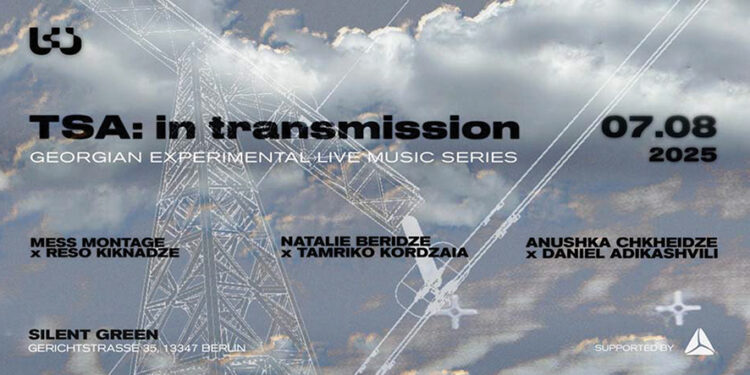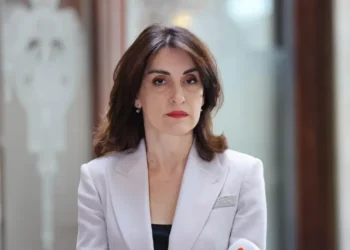In a climate where sound is increasingly policed and art is made to answer to power, the decision to play music becomes an act of defiance. On August 7, 2025, the Georgian experimental platform TSA Music will launch a new series, TSA: in transmission, at Berlin’s Silent Green Kulturquartier — a former crematorium turned artistic haven. This is no ordinary concert series: it is a broadcast of resistance, a transmission of sonic memory, and a strategic cultural relocation. For Georgia’s experimental musicians, Berlin is not just another European city. It is a refuge, a stage, and, increasingly, a necessity.
TSA: The Archive That Became a Lifeline
Founded in 2019, TSA (which stands for “Transmission Sound Archive”) began as a digital platform devoted to mapping the emergent and often-overlooked topography of Georgian experimental sound. What started as an online space of discovery — interviews, mixtapes, archival links — has since evolved into something far more urgent: a cultural ecosystem.
From the beginning, TSA positioned itself not merely as a cataloger of music but as a catalyst. It gathered fragmented local scenes — from ambient producers in Kutaisi basements to improvisational jazz performers in Tbilisi warehouses — and stitched them into something resembling a sonic narrative. By 2024, this archive began taking on physical form through events, workshops, and concerts. But just as TSA was expanding into the real world, the real world began closing in.
A Nation That Closes Its Ears
Georgia in 2025 is no longer the tentative democratic experiment that once captured the world’s hopeful gaze. Mounting censorship, surveillance of artists, suppression of LGBTQ+ spaces, and the erosion of cultural autonomy have all rendered independent artistic initiatives increasingly precarious. For platforms like TSA, the barriers are no longer just logistical. They are existential.
In this context, TSA: in transmission is not a festival. It is a diaspora in sound. The decision to launch in Berlin — a city synonymous with post-wall cultural freedom and subterranean creativity — is both symbolic and strategic. TSA is exporting what Georgia threatens to silence. It is safeguarding what could be lost.
TSA Records: Resistance Etched in Vinyl
The Berlin edition presents three intergenerational and interdisciplinary collaborations, each pairing prominent figures from Georgia’s electronic and experimental music scenes. Mess_Montage x Reso Kiknadze, Anushka Chkheidze x Daniel Adikashvili, Natalie Beridze x Tamriko Kordzaia — these duets are not merely performances; they are dialogues across time, genre, and methodology. This is not a program designed to entertain. It is designed to provoke, mourn, and insist.
In tandem with the event, TSA announces the launch of TSA Records, a vinyl imprint dedicated to preserving and distributing recordings from each collaboration. These won’t be promotional souvenirs — they’re intended as archival documents. In an era when digital files vanish with regime change and memory holes deepen with every algorithmic purge, vinyl is a political medium. It resists deletion. It demands shelf space.
Each pressing will carry the tactile weight of a time, place, and urgency that cannot be replicated. In this sense, TSA: in transmission is also a historical intervention: music as both message and monument.
Between Exile and Echo
The concept of “transmission” in TSA’s new title is layered. It is at once technical (broadcasting sonic ideas), political (spreading cultural resistance), and intimate (passing down a lineage under threat). The phrase evokes Cold War-era shortwave radios — Georgians huddled to hear Radio Free Europe through the static — and also speaks to the present: an algorithmic age where culture is both disseminated and surveilled.
Berlin may be the first station in this transmission, but the implication is clear: this is the beginning of a series, a relay of resilience across borders. TSA is reimagining the very idea of a national music scene — not as geographically fixed, but as diasporic, mobile, and irreducibly collaborative.
The involvement of TBC Bank indicates that even within constrained national contexts, alliances for cultural freedom can still be forged. But the deeper truth of TSA: in transmission lies elsewhere. It is a bet on the idea that sound, once freed, becomes unstoppable. It can carry messages across oceans, slip through censorship, and gather new meaning in new ears. In a world where borders harden and speech tightens, TSA: in transmission offers something radical: music as contagion rather than containment. The signal is live. The resistance is audible. The transmission has begun.
By Ivan Nechaev














